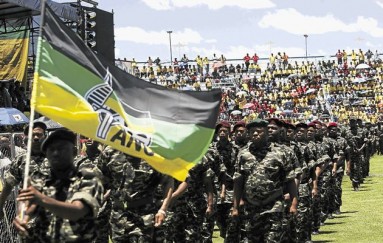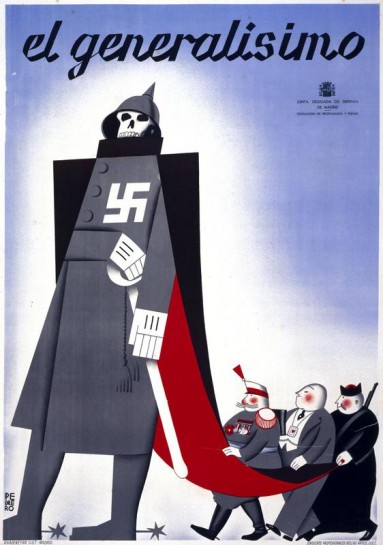The disbanding of the MK was one of the biggest public relations bonanzas of all time, for I have no doubt whatsoever that every Black person in the stadium (and here I include myself for there were moments when I could not contain my joy and I, too, stood and toyi toyied) felt as though something of true value was finally being given to us, when in point of fact, one of the only true things we had ever possessed, a People's Army, was being taken away.
[...]
Throughout the entire ceremony neither Oupa nor Precious took to the stage to be decorated by Madiba. Nor did Jabu, Trevor, or Stimela. As Mandela pinned the medal to the soldier who let the Boers know he was no springbok to be tied to the top of a Land Rover, I stood and toyi toyied and cheered. When I sat down, Stimela, who had neither risen nor cheered, looked at me sternly.
"That comrade is now useless as an operative. He's been exposed. That medal is a shackle. He's rendered himself inoperative and given his consent to the end of armed struggle--not to the temporary suspension, which is all this was supposed to be, but to the end. That's nothing to cheer about."
-Frank B. Wilderson III, Incognegro
Then comes the marvelous scene of the October Revolution, with soldiers and sailors galloping along the open space before the white marble building. They dash up the steps into the palace, there is a brief struggle, and the victors are hailed by the masses in wild jubilation. The “Internationale” ?oats upon the air; it mounts higher and higher into exultant peals of joy. Russia is free — the workers, sailors, and soldiers usher in the new era, the beginning of the world commune!
Tremendously stirring was the picture. But the vast mass remained silent. Only a faint applause was heard from the great throng. I was dumbfounded. How explain this astonishing lack of response? When I spoke to Lisa Zorin about it she said that the people had actually lived through the October Revolution, and that the performance necessarily fell ?at by comparison with the reality of 1917. But my little Communist neighbor gave a different version. “The people have suffered so many disappointments since October, 1917,” she said, “that the Revolution has lost all meaning to them. The play has the e?ect of making their disappointment more poignant.”
-Emma Goldman, My Disillusionment in Russia
Every day there were three shifts of police. When they changed shifts, the two troopers would salute the sergeant. Some saluted an army salute, but others saluted like the nazis did in Germany. They held their hands in front of them and clicked their heels. I couldn't believe it. One day one of them came in and gave a speech about how he fought in World War II on the wrong side...He said that if Hitler had won, the world wouldn't be in the mess it is in today, that niggers like me, no-good niggers, wouldn't be going around shooting new jersey state troopers.
He went on to say that the white race had invented everything because they were smart and worked hard, that other races wanted to riot and use terrorism to take everything the white race had worked so hard to get...Every day he gave me a speech about nazism. Sometimes other nazis would join in. I asked him if there were a lot of nazis in the state troopers, but he just laughed and kept on talking.
-Assata Shakur, Assata
"To-day, we are called to celebrate the seventy-eighth anniversary of American Independence. In what spirit? With what purpose? To what end?....What could there be to celebrate on July 4?" he asked.
Garrison then produced a copy of the 1850 Fugitive Slave Law and put a match to it. Amid cries of "Amen" the hated document burned to a cinder....Holding up a copy of the U.S. Constitution, he branded it as "the source and parent of all the other atrocities--a covenant with death, and an agreement with hell!" As the nation's founding document burned to ashes, he cried out: "So perish all compromises with tyranny!"
-Donald Yacovone, quoting and paraphrasing William Lloyd Garrison's 1854 July 4th address
But the triumph of electoral common sense over the convictions of a lifetime had many consequences in Spain that no one had anticipated. The Spanish workers were ready to take on the political right, but the politicians of the left were not. The army was poised to seize power, but the government was not willing to resist. In his book Lessons of the Spanish Revolution, Vernon Richards raised a forbidden question: did the CNT leadership take into account that by ensuring the electoral victory of the left it was also ensuring that the generals of the right would stage a military putsch which the respectable left politicians would not restrain? ‘On the other hand a victory of the right, which was almost certain if the CNT abstained, would mean the end of the military conspiracy and the corning to power of a reactionary but ineffectual government which, like its predecessors, would hold out for not more than a year or two. There is no real evidence to show that there was any significant development of a fascist movement in Spain along the lines of the regimes in Italy and Germany.’
...The Spanish revolution of 1936 was forced upon the working class by the election of the Popular Front and its capitulation to the insurgent generals. It was subsequently eliminated in the name of national unity in combating the right, which by then had won international backing. Having participated in the elections the next step was participation in government by the CNT/FAI leadership. This led to the permanent destruction of their own movement and the suppression of the popular revolution, and was followed by 40 years of fascist dictatorship.
-Colin Ward, The Case Against Voting


